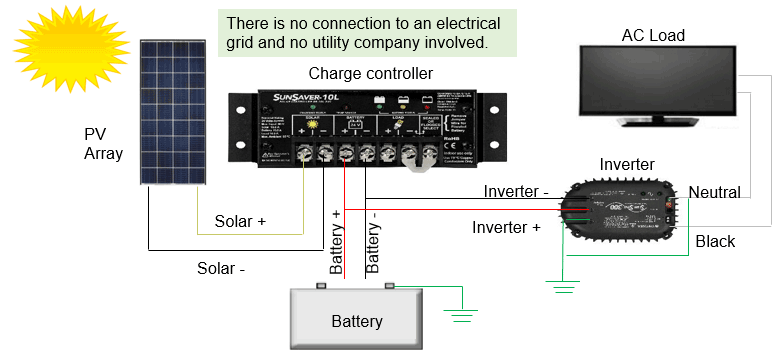Looking for information on a specific term? Visit our Glossary page.
Answers to more detailed questions are available in our Q&A blogs. Visit our Q&A Blog.
What Is An Off-Grid Inverter?
An off-grid inverter is a device that converts direct current (DC) power generated by sources such as solar batteries, generators, and fuel cells into alternating current (AC) power, which is […]
Are MPPT Controllers Worth It?
MPPT controllers provide more power, especially in colder temperatures. They can also be used with less expensive 60-cell modules which are usually unsuitable for PWM controllers. Weighing these benefits versus the lower cost of a PWM controller will determine if an MPPT controller is right for your system.
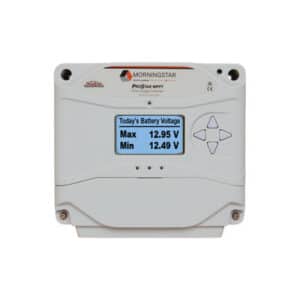
While MPPT controllers cost more than PWM controllers, the following benefits often outweigh the extra cost:
- The additional power provided by the newer charging technology associated with MPPT controllers enables them to run larger electrical loads and help batteries maintain a higher state of charge which prolongs battery life. Since batteries typically cost several times more than charge controllers, the extra power that MPPTs provide is sometimes worth their higher price tag even before other benefits are considered. The amount of additional power an MPPT controller provides increases as temperature decreases. The extra boost provided by an MPPT is conservatively estimated to be 5-10%, but this boost can be much higher if temperatures are below room temperature for at least part of the day when the sun is shining.
- MPPT controllers can be used with less expensive 60-cell modules that are usually not suitable for PWM controllers. Large systems deploying MPPT controllers with multiple 60 cell modules in series and parallel are often less expensive than similarly sized systems with PWM controllers and 72 cell nominal modules.
- MPPT controllers allow systems to support oversized PV arrays. Both MPPT and PWM controllers will be damaged if their Voc limits are exceeded by oversized PV arrays, but Morningstar MPPT controllers can be connected to arrays that exceed their current ratings. The MPPT controllers are able to limit the current intake and avoid damage. This is not the case with PWM controllers. Oftentimes it is advantageous to oversize arrays by 20% so that batteries can maintain a higher state of charge during several consecutive days of limited sunshine.
It is very common to see MPPT controllers deployed in larger systems, whereas PWM controllers are still very suitable and economically viable for some smaller systems.
MPPT controllers provide more power, especially in colder temperatures. They can also be used with less expensive 60-cell modules which are usually unsuitable for PWM controllers. Weighing these benefits versus […]
Read More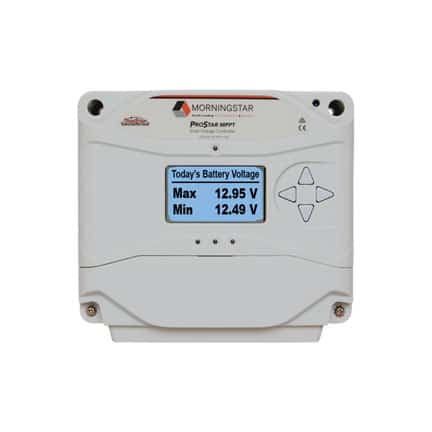
What is an Off-Grid Solar System?
The solar electric systems associated with the term “solar” are usually simple grid-tied types, with PV modules and an inverter or inverters for converting DC from the modules to AC for running loads. They save their owners money by offsetting utility bills or selling back power to the utility, and that’s as far as they go.
But much of the world is not connected to a grid, or even nowhere near one. In these situations, all electricity has to be generated on-site. These sites can range from remote communities, resorts, farms, and cabins to mines, oil & gas fields and pipelines, national park facilities, traffic control systems, railroad systems, marine platforms, monitoring stations, security installations, maritime navigation systems, remote highway lighting, weather stations, and much, much more.
Difference Between Grid Tied and Off Grid Solar Systems
Unlike grid tied systems, off grid solar systems are not connected by wires and cables to an electric grid and powered by a utility company. An off-grid system has to supply all power by energy that is stored onsite in batteries that are charged by solar. A generator may also be deployed to assist with battery charging and powering loads when there are several consecutive days of limited or no sunshine. But solar power is more economically viable, cleaner, and easier to maintain than fuel generators
In these applications, the main reason to “go solar” is not so much going green as it is saving green—in this case, saving the dollars it might take to connect a remote location to a grid. Under the best circumstances with minimal terrain considerations, it can cost a minimum of $50,000 just to run a mile of transmission line for a single home in the developed world—and in less developed places with multiple users or greater energy needs, and with mountains, rivers or forests to contend with, the cost increase maybe hundreds of times that often prohibitive. So are generators, which require expensive maintenance, constant fueling, and produce round-the-clock noise and emissions. Often in these situations, solar is not just the cleanest choice—it may be the only choice.
Anywhere there’s no grid, or a weak or intermittent grid, solar electricity generated on-site must be stored for use when the sun isn’t shining. That’s where Morningstar solar controllers come in. The charge controller is the “heart and brains” of a solar electric system relying on batteries to operate. The controller ensures that the batteries are neither over-charged or under-charged, or drained too deeply, or operated in extreme temperatures since all those conditions can dramatically shorten their life. The controller also controls loads, such as lighting systems connected to solar modules and batteries, for timely operation. If there’s an inverter in the system the controller “partners” with it to ensure optimum battery charging.
Off-Grid Basics Diagram
This simplified diagram below illustrates the major components of an off-grid system and how it works:
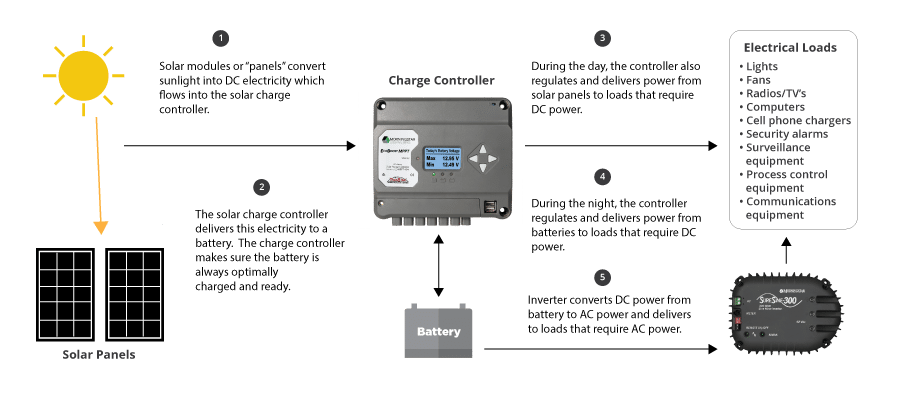
The solar electric systems associated with the term “solar” are usually simple grid-tied types, with PV modules and an inverter or inverters for converting DC from the modules to AC […]
Read More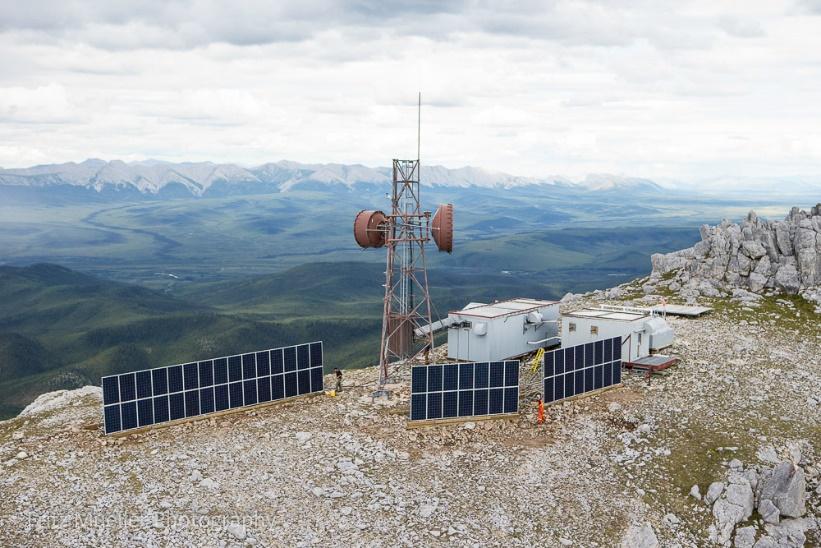
What is a Solar Charge Controller?
A solar charge controller is a solar-powered voltage and current regulator. They are used in off-grid and hybrid off-grid applications to regulate power input from PV arrays to deliver optimal power output to run electrical loads and charge batteries. Solar charge converters are also commonly called solar charge regulators.
What Does a Solar Charge Controller Do?
Solar charge controllers maintain batteries at their highest state of charge without overcharging them to avoid gassing and battery damage. Learn more by watching our on-demand webinar below, and by reading the additional information on this page.
Reliable charging to maintain battery health and extend battery life is affected by how well, and how fast, the controller’s software controls the electronic component hardware. Battery and PV voltage and current can change in split seconds and the power electronics in the controller must be able to respond fast enough to accommodate these changes.
Most people don’t see or recognize dramatic voltage and current changes going on within their controllers, but if they did have the scopes and sophisticated monitors that could show what is actually happening, they could tell which controllers are going to have the best effect on battery life.
You can have the best batteries and best modules in the world, but they’re only as reliable as your controller. A poor controller can cause battery failure and complete failure with your entire solar system. The best solar charge controllers extend battery life for many years beyond their normal life expectancy, whereas inferior controllers cause premature battery failure and can render your PV system inoperable.
The solar charge regulator generally represents about 10% of your total off-grid power system costs, whereas batteries can be about 40% of your first-time cost and 80% of your lifetime costs. So, the small amount of money you might save deploying a cheaper charge controller will pale in comparison to the money and time wasted on battery replacement. You can use the best PV modules, batteries, wiring, and loads, but their capabilities will be restricted by the quality of the charge controller.
A solar charge controller is a solar-powered voltage and current regulator. They are used in off-grid and hybrid off-grid applications to regulate power input from PV arrays to deliver optimal […]
Read More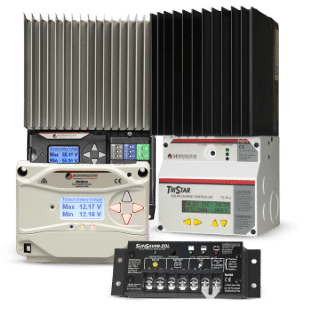
How Does a Solar Charge Controller Work?
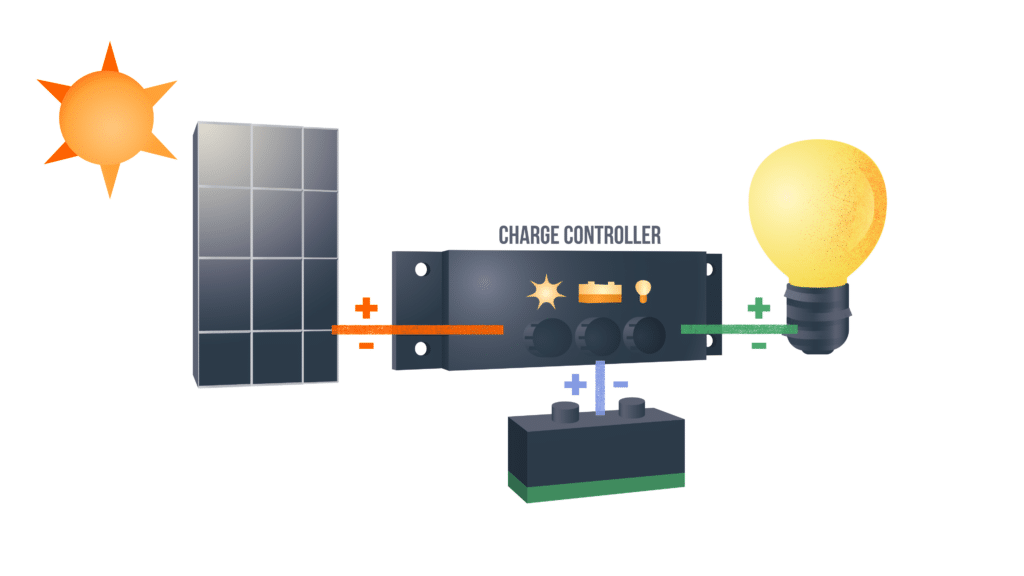
What is a solar charge controller?
A solar charge controller is an electronic device used in off-grid and hybrid off-grid applications to regulate current and voltage input from PV arrays to batteries and electrical loads (lights, fans, monitors, surveillance cameras, telecom and process control equipment, etc.). The controller safely charges and maintains batteries at a high state of charge without overcharging. A good solar charge controller can extend battery life, whereas a poor quality charge controller can cause battery failure and which causes the entire off-grid system to shut down. Solar charge controllers are also commonly called solar charge regulators.
View our controllers, inverters and accessories pages for information on a specific Morningstar product.
What does a solar charge controller do?
Solar charge controllers are used in off-grid systems to maintain batteries at their highest state of charge without overcharging them to avoid gassing and battery damage. This helps to prolong battery life. Charge controllers also deliver proper current and voltage that meets the rated capacity of electrical loads. Without a charge controller connected to the PV array, the array would deliver too much power which would destroy the batteries and loads.
How does a solar charge controller work?
Solar charge controllers typically deploy either pulse width modulation (PWM) or maximum power point tracking (MPPT) technology to regulate and deliver the right amount of current and voltage from PV arrays to run electrical loads and safely charge batteries during the day. Then during the evening when there is no sunshine, the controller allows the battery bank to run the electrical loads. Solar controllers have electronic protections to protect against nighttime reverse current, short circuiting, high voltage, high temperatures, and battery reverse polarity. Additionally some controllers have low voltage disconnect capabilities and are equipped with LED warning lights to alert about installation errors and faults within the system.
The first solar charge controller schematic below (Figure 1) illustrates how a solar charge controller is connected to power a direct current (DC) load, and the second one (Figure 2) pertains to an alternating current (AC) load.
Figure1: Off-grid Diagram with DC Load
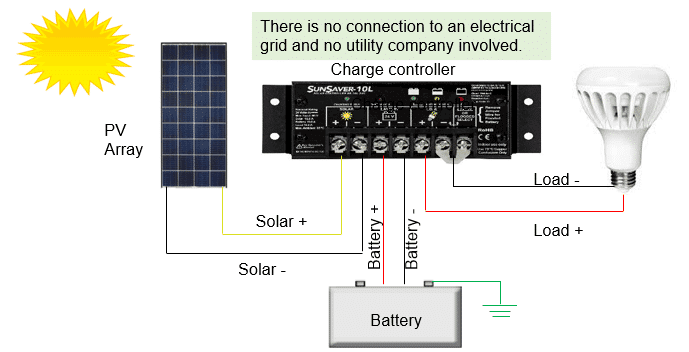
When installing a solar charge controller, it is recommended that you connect and disconnect in the following order:
- Battery to the controller first
- PV array to the controller
- Electrical load to the controller
When disconnecting, you reverse that order. The battery provides power to the controller so always make sure that solar and loads are disconnected before connecting or disconnecting the battery from the controller. Connections between the battery, load, PV array, and the controller should have disconnect switches to enhance safety and facilitate ease of installation and breakdown.
In the wire diagram schematic above with DC load, sunlight contacts the solar modules, which convert solar into DC electrical power that it delivers to a charge controller. The charge controller regulates the amperage and voltage that is delivered to the loads and any excess power is delivered to the battery system so the batteries maintain their state of charge without getting overcharged. During the evening when there is no sunlight, battery power is used to run the load.
You’ll notice that the battery is grounded at the negative battery terminal. This is because all our PWM and MPPT controllers have a common negative ground. Therefore, it is possible to establish a common negative ground for the entire system: the solar array, controller, battery, and load. This meets NEC code requirements for grounding. If you need an equipment ground for any metal parts on a controller enclosure, some of our controllers include an equipment ground terminal lug. Otherwise, for our controllers that don’t have this terminal lug, you can connect an equipment ground directly to the controller enclosure.
The next diagram (Figure 2) depicts the components and connections to power an AC load. This diagram with an AC load looks similar to the previous example with a DC load, except that in this example, we have added an inverter to the system. The purpose of the inverter is to convert the DC power from the battery to AC power that can be used to run an AC load like the TV you see in the schematic.
Figure 2: Off-grid Diagram with AC Load
It’s important to note that the inverter is connected and powered from the battery, not the controller’s load terminals like we did in the DC load example. That’s because the inverter can have a high energy surge upon startup, and this high current surge might be higher than the rated capacity of the charge controller, whereas the batteries will be able to meet the high energy surge requirement.
Buy the World’s Leading Solar Charge Controllers
Morningstar charge controllers are the first choice in every challenging solar application—and sometimes the only choice—for mission-critical users. Some are certified for hazardous locations and are standard in the oil & gas industry, for example. Others are proven in demanding telecommunications, mining, security, transportation, and other sectors. Morningstar electronics even power the world’s largest off-grid solar residential project in Peru, supplying electricity to over 200,000 homes. Contact us to find your nearest distributor or talk to a representative about your project.
What is a solar charge controller? A solar charge controller is an electronic device used in off-grid and hybrid off-grid applications to regulate current and voltage input from PV arrays […]
Read More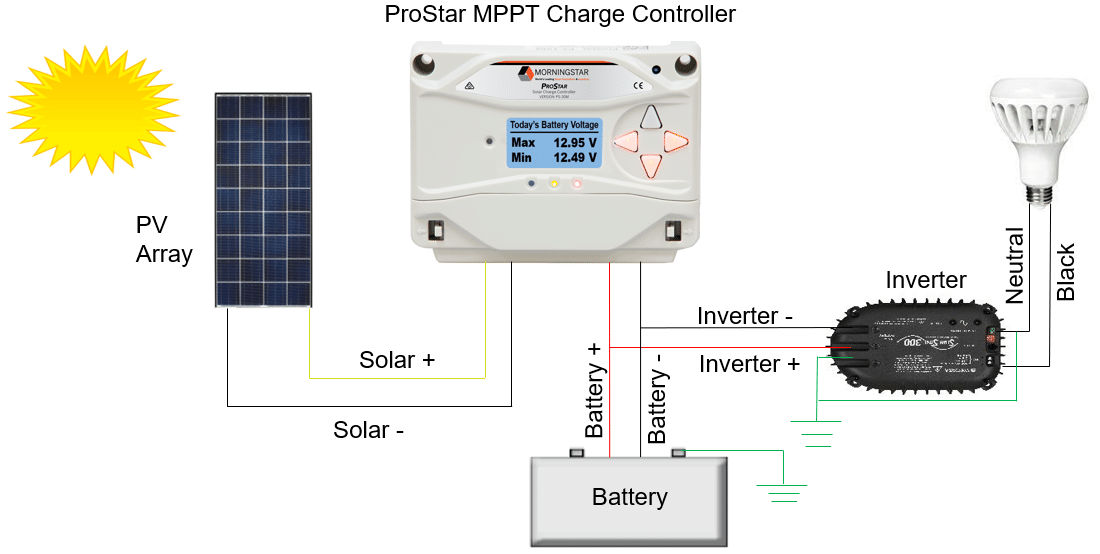
What are the Solar Battery Charging Stages?
Solar charge controllers put batteries through 4 charging stages:
- Bulk
- Absorption
- Float
- Equalize
What are the 4 Solar Battery Charging Stages?
Bulk Charging Voltage
For lead-acid batteries, the initial bulk charging stage delivers the maximum allowable current into the solar battery to bring it up to a state of charge of approximately 80 to 90%. During bulk charging for solar, the battery’s voltage increases to about 14.5 volts for a nominal 12-volt battery.
Absorption Charging
When Bulk Charging is complete and the battery is about 80% to 90% charged, absorption charging is applied. During Absorption Charging, constant-voltage regulation is applied but the current is reduced as the solar batteries approach a full state of charge. This prevents heating and excessive battery gassing. At the end of Absorption Charging, the battery is typically at a 98% state of charge or greater.
Float Charging
Float charging, sometimes referred to as “trickle” charging occurs after Absorption Charging when the battery has about 98% state of charge. Then, the charging current is reduced further so the battery voltage drops down to the Float voltage.
The Float charge of a battery keeps the battery at maximum capacity throughout the day.
Equalization Charging
For flooded open vent batteries, an Equalization charge is applied once every 2 to 4 weeks to maintain consistent specific gravities among individual battery cells. The more deeply a battery is discharged on a daily basis, the more often equalization charging is required. Solar Charge Controller Equalization is for flooded, not for sealed, GEL, or valve-regulated batteries which can be damaged by equalization.
Figure 3: Multi-Stage Battery Charging Diagram
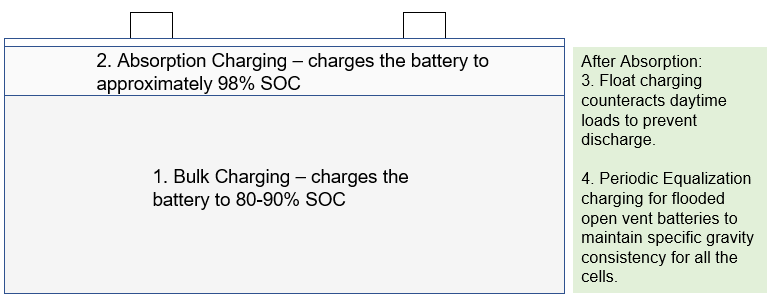
Although lead-acid batteries are the most common type of battery regulated by solar charge controllers, lithium batteries are starting to gain traction. Morningstar launched an Energy Storage Partner program that involves working with many lithium iron phosphate battery manufacturers to maintain the highest state of charge for their batteries and to help maximize battery life.
The integration guides you can download provide custom solar charge controller voltage and time settings for absorption and float charging, and other information that you will need to charge your batteries safely and to increase their longevity. In addition to lead-acid and lithium, Morningstar solar charge controllers can also charge nickel, aqueous hybrid ion, and flow or redox flow batteries.
Solar charge controllers put batteries through 4 charging stages: Bulk Absorption Float Equalize What are the 4 Solar Battery Charging Stages? Bulk Charging Voltage For lead-acid batteries, the initial bulk […]
Read More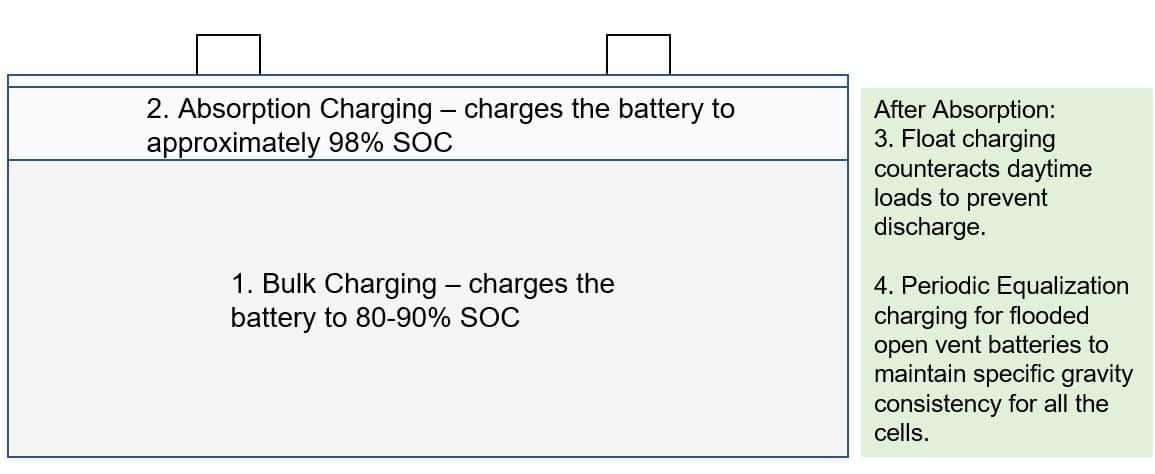
What are the Different Types of Solar Charge Controllers? PWM vs MPPT
MPPT vs PWM | The two major types of solar charge controllers are:
As shown in the chart below, PWM controllers tend to be smaller and they operate at battery voltage, whereas MPPT controllers use newer technology to operate at the maximum power voltage. This maximizes the amount of power being produced which becomes more significant in colder conditions when the array voltage gets increasingly higher than the battery voltage. MPPT controllers can also operate with much higher voltages and lower array currents which can mean fewer strings in parallel and smaller wire sizes since there is less voltage drop.
PWM controllers need to be used with arrays that are matched with the battery voltage which limits what modules can be used. There are many 60 cell modules with maximum power voltage (Vmp) equal to about 30V, which can be used with MPPT controllers but are simply not suitable with PWM controllers.
To answer the question: Which is better, PWM or MPPT? All things being equal, MPPT is a newer technology that harvests more energy. However, the advantages of MPPT over PWM controllers come at a cost, so sometimes a less expensive PWM controller can be the right choice, especially with smaller systems and in warm climates where the MPPT boost is not as significant.
PWM vs. MPPT Solar Charge Controller Comparison
| PWM Controllers | MPPT Controllers |
|---|---|
| Array voltage is “pulled down” to battery voltage | Convert excess input voltage into amperage |
| Generally operate below Vmp | Operate at Vmp |
| Suitable for small module configurations | Suitable for large module configurations that have a lower cost per watt |
| Often chosen for very hot climates which will not yield as much MPPT boost | Provide more boost than PWM, especially during cold days and/or when the battery voltage is low |
Every Morningstar PWM and MPPT solar charge controller is listed on the Morningstar Product Series page. Each listed product is hypertext linked to its product page that includes datasheets, operation manuals, and other helpful information.
PWM Charging
Traditional solar regulators featuring PWM (Pulse Width Modulation) charging operate by making a connection directly from the solar array to the battery bank. During bulk charging when there is a continuous connection from the array to the battery bank, the array output voltage is ‘pulled down’ to the battery voltage. The battery voltage adjusts slightly up depending on the amount of current provided by the array and the size and characteristics of the battery.
MPPT Charging
Morningstar MPPT controllers feature TrakStar technology, designed to quickly and accurately determine the Vmp (maximum power voltage) of the solar array. TrakStar MPPT controllers ‘sweep’ the solar input to determine the voltage at which the array is producing the maximum amount of power. The controller harvests power from the array at this Vmp voltage and converts it down to battery voltage, boosting charging current in the process.
Why Choose PWM Over MPPT
The preceding discussion of PWM vs. MPPT may cause some to wonder why a PWM controller would ever be chosen in favor of an MPPT controller. There are indeed instances where a PWM controller can be a better choice than MPPT and there are factors which will reduce or negate the advantages the MPPT may provide. The most obvious consideration is cost. MPPT controllers tend to cost more than their PWM counterparts. When deciding on a controller, the extra cost of MPPT should be analyzed with respect to the following factors:
1. Low power (specifically low current) charging applications may have equal or better energy harvest with a PWM controller. PWM controllers will operate at a relatively constant harvesting efficiency regardless of the size of the system (all things being equal, efficiency will be the same whether using a 30W array or a 300W array). MPPT regulators commonly have noticeably reduced harvesting efficiencies (relative to their peak efficiency) when used in low power applications. Efficiency curves for every Morningstar MPPT controller are printed in their corresponding manuals and should be reviewed when making a regulator decision. (Manuals are available for download on the Morningstar website).
2. The greatest benefit of an MPPT regulator will be observed in colder climates (Vmp is higher). Conversely, in hotter climates Vmp is reduced. A decrease in Vmp will reduce MPPT harvest relative to PWM. Average ambient temperature at the installation site may be high enough to negate any charging advantages the MPPT has over the PWM. It would not be economical to use MPPT in such a situation. Average temperature at the site should be a factor considered when making a regulator choice
3. Systems in which array power output is significantly larger than the power draw of the system loads would indicate that the batteries will spend most of their time at full or near full charge. Such a system may not benefit from the increased harvesting capability of an MPPT regulator. When the system batteries are full, excess solar energy goes unused. The harvesting advantage of MPPT may be unnecessary in this situation especially if autonomy is not a factor.
Why Choose MPPT Over PWM
Increased Energy Harvest:
MPPT controllers operate array voltages above battery voltage and increase the energy harvest from solar arrays by 5 to 30% compared to PWM controllers, depending on climate conditions.
Array operating voltage and amperage is adjusted throughout the day by the MPPT controller so that the array’s power output (amperage X voltage) is maximized.
Less Module Restrictions:
Since MPPT controllers operate arrays at voltages greater than battery voltage, they can be used with a wider variety of solar modules and array configurations. Moreover, they can support systems with smaller wire sizes.
Support for oversized Arrays
Unlike PWM controllers, MPPT controllers can support oversized arrays that would otherwise exceed the maximum operating power limits of the charge controller. The controller does this by limiting the array current intake during periods of the day when high solar energy is being supplied (usually during the middle of the day).
While energy from the array is capped or shaved off during the middle of the day, the oversized array is able to provide more power during teh early and late part of the day compared to smaller non-oversized array.
Download Our PWM vs MPPT White Paper
Please click here to download the Traditional PWM vs Morningstar’s TrakStar™ MPPT Technology white paper. Morningstar’s MPPT charge controllers use the TrakStar advanced control MPPT algorithm to harvest maximum power from a Solar Array’s peak power point. It is generally accepted that even the most basic MPPT controller will provide an additional 10‐15% of charging capability, when compared to a standard PWM regulator. Besides this extra charge capability, there are several other important differences and advantages between MPPT and PWM technologies that are outlined in this whitepaper.
MPPT vs PWM | The two major types of solar charge controllers are: Pulse Width Modulation (PWM) controllers Maximum Power Point Tracking (MPPT) controllers As shown in the chart below, […]
Read More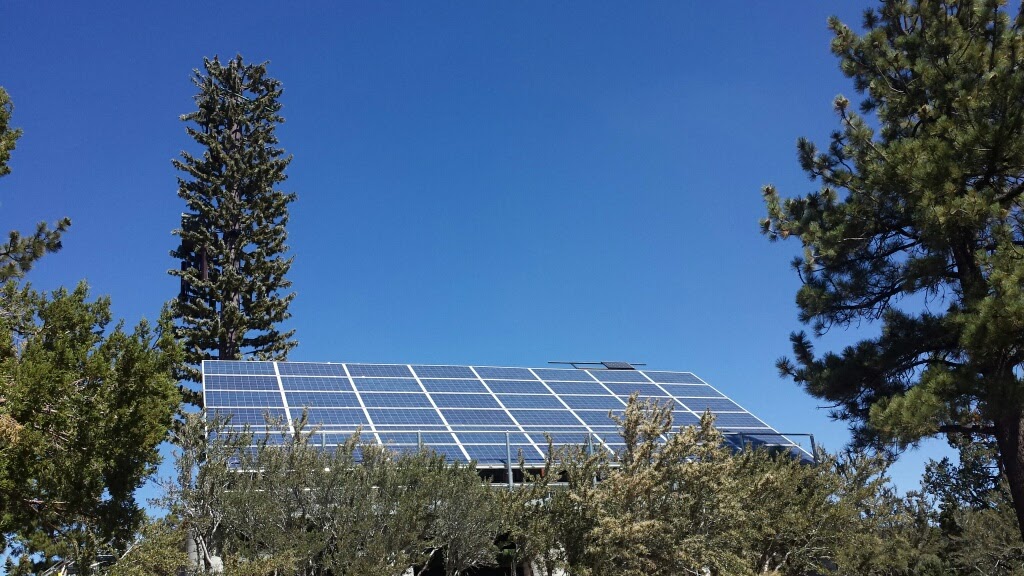
What is Different About Morningstar Solar Charge Controllers?
Morningstar solar charge controllers are different from other brands, as you can see in this five-minute video. The high-frequency design allows Morningstar solar charge controllers to react more quickly to rapidly changing conditions. This provides higher efficiency over a wide variety of Power Ranges. Moreover, Morningstar’s TRAKStar technology deployed in its MPPT controllers provides industry-leading sweeping speed of the entire IV curve and leads to a higher energy harvest compared to our competitors.
Regarding our high-temperature architecture, Morningstar uses a higher grade of copper pour in our printed circuit boards, higher temperature rated terminals, and 105-degree C-rated capacitors for Reliable off-grid operation in extreme temperatures. This all adds up to the very long life and high reliability of the electronic components.
Morningstar controller cases are metal or very durable Lexan polycarbonate which is much more durable and protective than thermoplastics that are used in other controller brands.
If you are using lithium batteries, sometimes temperatures delve into the ranges that are outside the charging window for the battery. For Morningstar’s newer controllers, the battery charging algorithm can be set to account for low temperatures and reduce charging current during those periods in order to maintain long battery life.
Many controller brands have a 2-year warranty, but Morningstar’s Professional Series controllers have a 5-year warranty.
And all Morningstar controllers are passively cooled without fans which create noise and are known to draw in dust and debris across the circuit board. Furthermore, fans can fail, thus causing the controller to retain heat which diminishes the product’s quality, performance, and longevity.
Below is a snapshot of some of the components within the case of a Morningstar ProStar MPPT solar charge controller to give you a better idea of what sets it apart.
Figure 4: ProStar MPPT controller components
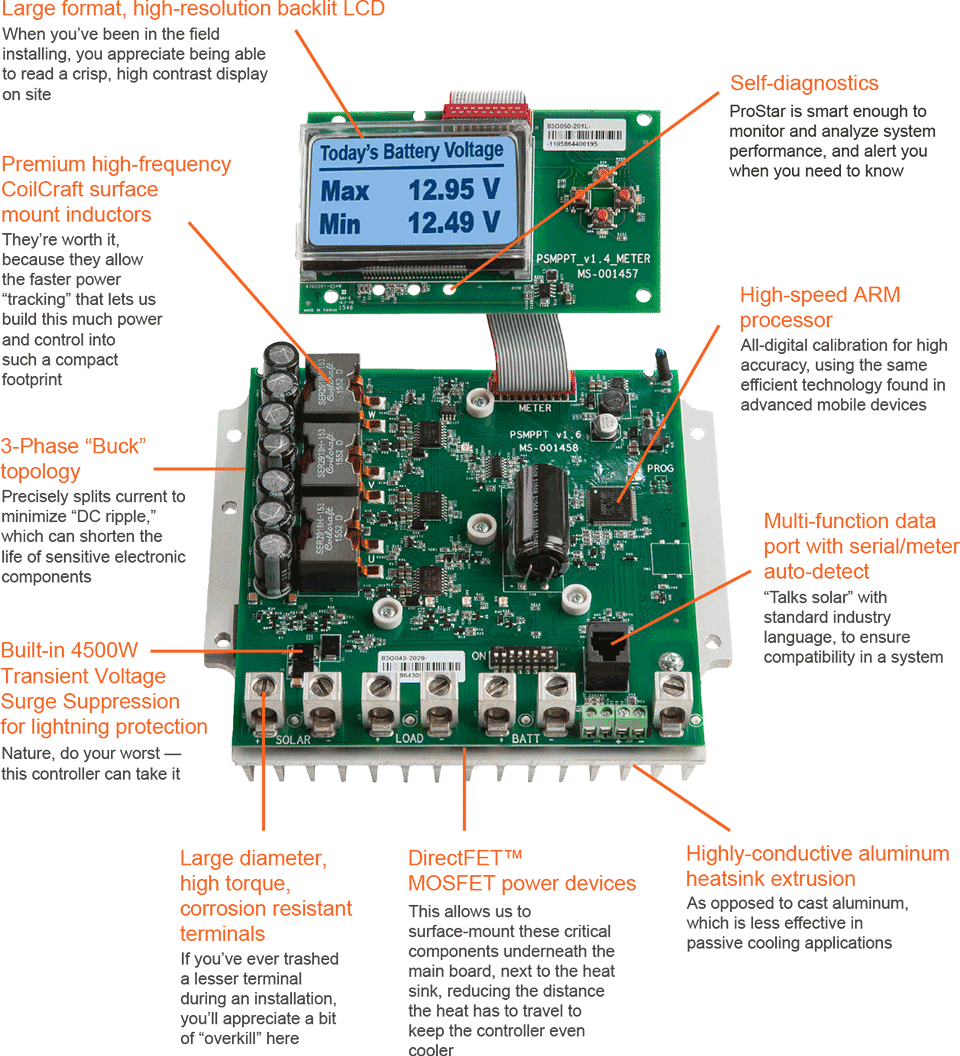
This Morningstar controller’s meter provides a clear crisp backlight for high visibility even in direct sunlight.
The specific choice of Coilcraft inductors is made for compact design, high-speed operation, and surface mount Manufacturing to maximize design longevity.
A three-phase design in our MPPT buck converter allows us to cancel Much of the DC Ripple which is both hard on Power Electronics as well as the battery.
Fast-acting transient voltage suppressors provide a 4500W surge protection to prevent the number one cause of failure: induced surge damage from nearby lightning. These devices do not degrade and are designed to last as long as the life of the product.
The Wire terminals are a high torque and corrosion resistant, and large to help facilitate easy and reliable wire connections.
The direct field-effect transistors (FET’s) package for much of Morningstar’s switching technology is used because of the benefits of cooling, compact design, and reliable surface mount technology. By applying the FET’s on the backside of our board in direct contact with the heatsink thermal pad, they stay extremely cool.
The extruded heat sink design contains more pure aluminum than cast designs and ensures very high conductivity.
The data port on this controller supports MODBUS protocol and data logging of battery voltages, absorption charging times, and power inputs and outputs from the controller.
Morningstar utilizes ARM processors for their high-speed control ability and extensive IO and memory features.
Self-diagnostics are provided via LED lights that display or flash different colors to alert you if you have made an installation error, or if your controller is experiencing a short circuit, or high temperatures, or high voltage inputs.
Morningstar solar charge controllers are different from other brands, as you can see in this five-minute video. The high-frequency design allows Morningstar solar charge controllers to react more quickly to […]
Read More
Will Oversized PV Arrays Damage Solar Charge Controllers?
Morningstar’s MPPT solar charge controllers support oversized photovoltaic (PV) arrays. For example, a 240-watt module won’t damage a SunSaver MPPT solar charge controller and won’t cause it to exceed its rated 15 amps of output current as long as you don’t exceed Voc limits and you adhere to the other operating manual guidelines.
The graph below displays operating power versus time of day for the SunSaver MPPT controller that has a maximum operating power rating of 200W.
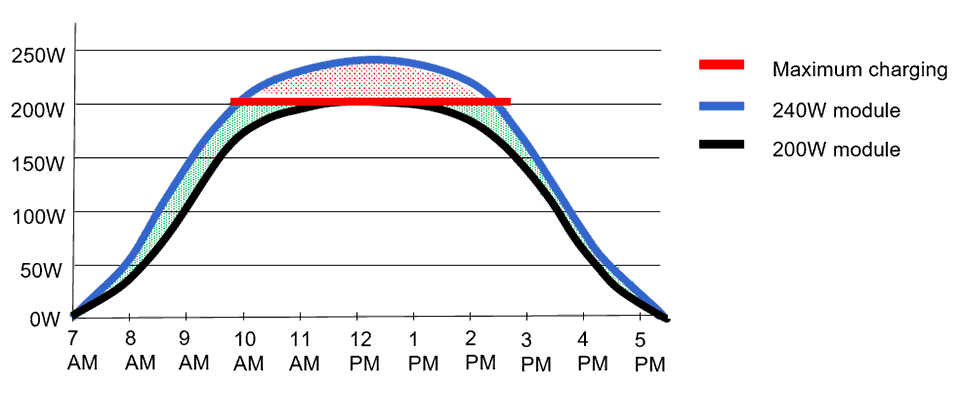
Here we are comparing the performance of a 200-watt module represented by a black curved line, to that of a 240-watt module represented by a blue line. This is an operation on a clear, sunny day at Standard test conditions and maximum power (Pmp). When using the 240-watt module, even though the power being delivered to the battery is limited to 200 watts, and the red area at the top of the production curve represents lost power, the larger 240-watt module is still harvesting more energy than the 200-watt module, as shown in green.
The larger module will provide better production with no power-shaving early and late in the day as compared to a smaller module. In this case, almost twice as much energy is gained (green area) as lost (red area) and you get 12.5% more energy available to charge your batteries than you would with the 200W module.
But what happens on days when it isn’t clear and sunny? The next graph below used real array data to depict what happens on days with intermittent sun and clouds for the 200 watts and 240-watt modules.
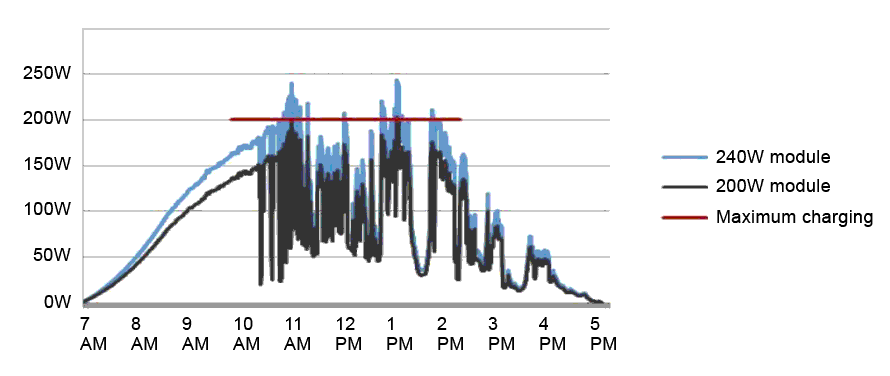
On these days there’s going to be little or no power-shaving and the extra power will serve the battery well with more energy harvest. On this day, for the 240-watt module, there is < 1% loss due to power-shaving (energy above the red line), so almost all of the excess power over the 200W module, represented by the blue over black on the graph, can be utilized for charging. So, systems that experience a lot of intermittent sun and shading during the day are very good candidates for oversized arrays.
Morningstar’s MPPT solar charge controllers support oversized photovoltaic (PV) arrays. For example, a 240-watt module won’t damage a SunSaver MPPT solar charge controller and won’t cause it to exceed its […]
Read More
Other Solar Charge Controller FAQs
How do I choose a solar controller?
In short, the solar charge controller you choose must be able to support the power requirements of your loads, your battery voltage, and your PV current and voltage inputs. Additionally, you will need to consider whether you need a controller with low voltage disconnect, lighting control, or other features or certifications. Your climate, choice of modules, and price will also determine whether you choose a PWM or an MPPT controller. A good solar distributor will be able to help you size and configure your modules, batteries, and controllers for an optimum system.
Can solar charge controllers monitor data?
Yes, some controllers are equipped to monitor data including battery voltages, system current, absorption and float charging metrics, and faults and alerts.
What temperature ranges do solar charge controllers support?
Many Morningstar solar charge controllers support operating temperature ranges between -40C and +60C.
Can two solar charge controllers charge the same battery?
Yes. You can read more about this in: Parallel Charging Using Multiple controllers with Separate PV Arrays.
What solar charge controller accessories should I consider?
Accessories to consider are meters, adapters, remote temperature sensors, relay drivers, and other balance of system components.
How can I purchase a solar charge controller?
You can describe what type of charge controller and system you are interested in deploying on our How To Buy page which includes links to a product catalog.
How long do solar charge controllers last?
The longevity of a charge controller depends on the brand and the system environment. The Morningstar Professional Series controllers have a 5-year warranty and many have been in operation for 10 years or more.
What is load control and low voltage disconnect (LVD)?
A feature that protects batteries from over-discharging by disconnecting electrical loads when a battery’s voltage drops below a certain setpoint. Load control and low voltage disconnect are two terms that mean the same thing.
What is lighting control?
The ability to program settings on controllers to power on and off lights during the day and evening. Some controllers have simple controls to turn lights on as dusk and off at dawn. Other controllers have more sophisticated programability to allow for multi-event on/off light switching during a 24-hour period.
What is diversion control?
As batteries become fully charged a controller will direct excess current from the battery to a dedicated load that is large enough to absorb the excess energy, but not too large to cause a controller overload condition.
What is a charge controller's rating?
A charge controller is rated by the current it can accept from a PV array to charge batteries and the battery voltages it will support (e.g. 60 amps for 12, 24, and 48-volt batteries).
What is load current rating?
The rated current that the controller will deliver to loads.
Are charge controllers rated for marine environments?
Some controllers, but not all, are built to withstand the harsh environments associated with boats and marinas.
What controllers are best for RV’s caravans, mobile homes, campers and boats?
See Solar for RV, Caravans, and Boating page
What controllers are best for security/surveillance monitoring?
See Solar for Security/Surveillance Monitoring page
What is self-consumption?
The small amount of power that the charge controller uses up for its own operational purposes rather than delivering to loads and batteries.
Why do you need a solar charge controller?
To regulate power from the PV array to prevent batteries from being overcharged or undercharged, and to prevent the battery from reverse-discharging to the array at night or when there is no power from the sun.
What are other names for a solar charge controller?
Other names for a solar charge controller include: solar panel controller, solar panel charge controller, solar power charge controller, solar controller, solar charge regulator, solar regulator, and charge regulator.
What is a shunt charge controller?
A type of charge controller that short circuits the array to reduce current sent to a battery. PWM and MPPT controller technology is newer and more prevalent than shunt technology.
What is a controller's Maximum PV Open Circuit Voltage (Voc) limit?
The maximum voltage, listed in the operator manual, that a controller can support. To determine whether your system will operate under this Voc limit you must know the lowest temperature your system will be exposed to, and calculate the voltage produced by your array at that temperature. Exceeding Voc limits will damage your controller.

